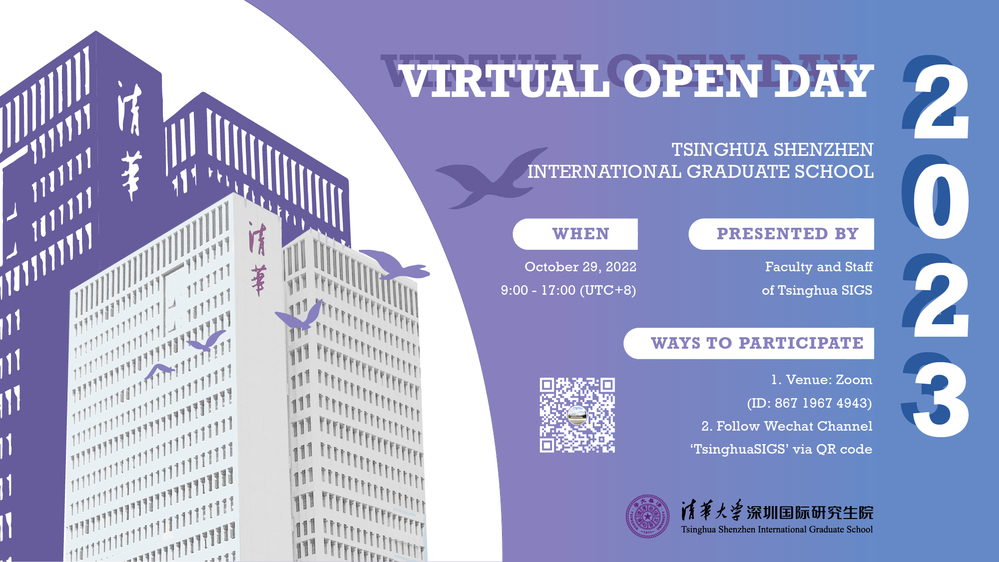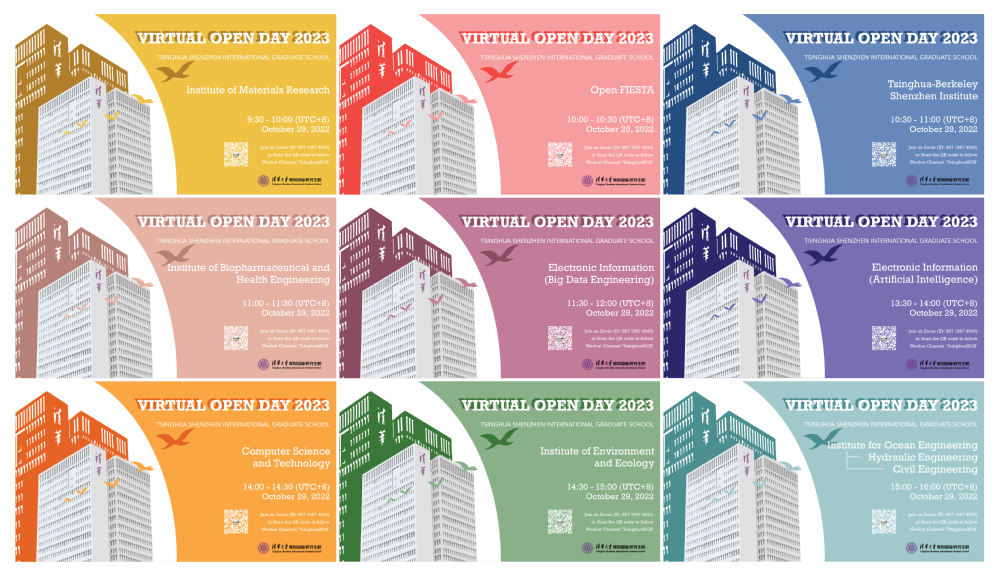
Attending an Open Day is a great opportunity to find out about the postgraduate programs we offer. Watch information sessions delivered by our faculties and get a deeper insight into our excellent programs. We are for you to provide all the information you want, including how we can help build your career path, what the curriculum is like, what kind of guidance and counselling we offer and most importantly, what it’s like to be a student at Tsinghua.
Come join us and discover where your future starts!
Tsinghua Shenzhen International Graduate School (Tsinghua SIGS) Virtual Open Day 2023 will be held on October 29th, 2022.
This event is organized by the Graduate Admission Office of SIGS and supported by recruiting institutes, divisions, and programs, including the Institute of Materials Research, Open FIESTA (Open Faculty for Innovation, Education, Science, Technology and Art), Tsinghua-Berkeley Shenzhen institute (TBSI), Institute of Biopharmaceutical and Health Engineering (iBHE), Institute of Environment and Ecology (IEE), Hydraulic Engineering, Civil Engineering, Computer Science and Technology, Big Data Engineering, Artificial Intelligence.
Participants will be able to receive information based on teaching resources, academic research, future development, and international educational features of each faculty. At the end, the Graduate Admission Office and Academic Affairs will discuss admission requirements and financial aid system, followed by a Q&A session.
See you @ SIGS Virtual Open Day!
When: 9:00 - 17:00, October 29, 2022 (Beijing Time, UTC+8)
Presented by: Tsinghua SIGS Faculty and Staff
Venue:
1. Zoom (ID:867 1967 4943)
2. Follow WeChat Account 'TsinghuaSIGS' via QR Code below

Open Day Schedule
Institute of Materials Research
Time: 9:30 – 10:00
Institute of Materials Research - or iMR for short - was established in 2020, and conducts innovative research in five areas: low-dimensional materials and devices, energy materials and devices, material design and computation, information functional materials and devices, and biomedical materials and devices. Our pioneering research and innovation in high-performance materials are applied to the fields of energy, information, health, and aerospace. With a team of nearly 40 full-time faculty members, as well as advanced scientific research facilities. iMR aims to provide world-class training for research and industrial talents in the field of new materials and build a global center for research in functional materials and devices.
Open FIESTA
(Open Faculty for Innovation, Education, Science, Technology and Art)
Time: 10:00 – 10:30
Open FIESTA (Open Faculty for Innovation, Education, Science, Technology and Art) was co-established by Tsinghua University and the CRI Paris (the Center for Research and Interdisciplinary, now formally changed name as “Learning Planet Institute”) in June 2015. Open FIESTA is dedicated to integrating global innovation resources, working towards the creation of new knowledge, exploring complex social or scientific problems, and nurturing students with a creative spirit, innovative thoughts and a sense of social responsibility.
Open FIESTA offers two master’s programs - Master of Precision Medicine and Healthcare (BIO³ (Bio-Nano-Info) focuses on the frontier of interdisciplinary scientific research covering life sciences, biotechnology, nanotechnology, and information technology, and Master of Electronic Information (Internet + Innovation Design) focuses on the frontier of research on cross-disciplinary innovation design based on information technology.
Tsinghua-Berkeley Shenzhen Institute
Time: 10:30 – 11:00
Tsinghua-Berkeley Shenzhen Institute (TBSI) was jointly established by Tsinghua University and University of California, Berkeley under the support of the Shenzhen Municipal Government. It is committed to exploring the cultivation mode in “university-government-enterprise tripartite cooperation” with the concepts of “interdisciplinary,” “internationalization” and “industrial partnership.” With integration of university, government and industry resources, training global technology leaders and future entrepreneurs, TBSI aimed to solve regional and global major issues of engineering and scientific research to provide high-quality talent.
Currently, TBSI has entered the second phase cooperation (2022-2025), focusing on the research direction of data science and information technology, with smart city as the theme, building an international and innovative talents education and research system with the integration of two high-quality scientific research and educational resources, and actively responding to and solving the regional and global problems facing major scientific and technological issues and social development.
Institute of Biopharmaceutical and Health Engineering
Time: 11:00 – 11:30
The Institute of Biopharmaceutical and Health Engineering (iBHE) aims to explore the frontiers of health technology and engineering for human wellness to meet the practical needs and long-term development strategy of building a “Healthy China” as well as Shenzhen’s biotechnology industry to improve national and global health outcomes.
The strategy of iBHE is to build international first-class disciplines that provide comprehensive science solutions and awareness-based revolutionary technologies for human health and happiness by integrating pharmaceutical engineering, bioengineering, life sciences, medical sciences, chemical engineering, process and system engineering, materials engineering, pharmaceutical engineering, vaccine engineering, and cell engineering, and other advanced discipline clusters. We offer 5 PhD programs as well as four Master’s programs. We firmly implement internationalization, interdisciplinarity and innovation through all these programs and we aim to cultivate high-level academic, innovative entrepreneurial and managerial talents oriented to the needs of global health.
Division of Information Science and Technology
The Division of Information Science and Technology (DIST) was established in 2002 on the foundation of four disciplines: Information and Communication Engineering, Control Science and Engineering, Computer Science and Technology, and Electronic Science and Technology. DIST's objective is to cultivate technical and inventive individuals with worldwide competency by concentrating on the advancement of research into fundamental theories and practical technologies in the realm of electronic information. As a significant graduate training location for Tsinghua University in electronic information, it takes full advantage of the disciplines' competence and the Greater Bay Area's electronic information sector, contributing to world-class disciplines and economic expansion.
Big Data Engineering
Time: 11:30 – 12:00
The full-time ME program in Big Data Engineering at Tsinghua SIGS aims to equip students with a solid theoretical foundation and in-depth professional knowledge in the acquisition, storage, computing, management, analysis and application of big data, and with strong industrial application ability, professional quality and international competitiveness. Graduates are expected to play leading roles as intelligence analysts, strategic decision makers or data scientists in research institutes, government agencies and enterprises in industries including Internet, Artificial Intelligence, Finance, Telecommunication, Healthcare, Transportation and Logistics, and to carry out high-level scientific research work.
Artificial Intelligence
Time: 13:30 – 14:00
Founded in 2019, as a successor to the M.E. in Control Engineering program, the Master of Engineering in Artificial Intelligence (MEAI) is an interdisciplinary postgraduate program. MEAI has set up multi-institutional collaborations with other academic institutions and industry partners that help to create a variety of programs and resources and jointly formulate talent training programs for MEAI students. The MEAI program focuses on creating a vibrant environment that accelerates breakthrough research across scientific and technological frontiers and a collaborative atmosphere that serves the strategic planning and industrial needs of national artificial intelligence development.
Computer Science and Technology
Time: 14:00 - 14:30
Expanded from the existing uniqueness of the department of Computer Science at Tsinghua University, the aim of this major is to cultivate students through the Computer Technology Graduate Program and Ph.D. of Computer Science & Technology programs. The Master’s and PhD programs of Computer Science and Technology have been recruiting students since 2009, with a focus on areas such as Internet technology, media computing, network security and intelligent computing/artificial intelligence. We focus on the innovation of basic computer theory and the industrial application of cutting-edge computer technology, as well as the training of students' practical ability. In the course design, the experimental practice teaching is highlighted, so that students can improve their overall quality and ability, and make greater contributions to scientific and technological innovation.
Institute of Environment and Ecology
Time: 14:30 – 15:00
The Institute of Environment and Ecology (iEE), as part of Tsinghua Shenzhen International Graduate School, is a vital part of Tsinghua's environmental science discipline. Oriented to the core needs of high-quality development and based on the forefront of international disciplines, the institute is committed to studying the theory of ecological and environmental protection, investigating key technologies, cultivating high-level personnel with global competence, and providing science and technology talent support for ecological civilization and community building with a shared future for mankind.
iEE aims to cultivate high-level environmental and ecological talents with international vision and global competence. Through the unified enrollment of Tsinghua University, it carries out doctoral and master's graduate education in Shenzhen, offering several Master's Programs and Doctoral Programs to international students. iEE has established the New Student Scholarship to encourage outstanding international students to apply and provides financial support.
Institute for Ocean Engineering
Hydraulic Engineering
15:00 – 15:30
Civil Engineering
15:30 – 16:00
Institute for Ocean Engineering, or IOE for short, was established in 2020, in line with the strategy of SIGS to develop the “6+1” theme areas. The institute has four doctoral programs, which are Civil Engineering, Hydraulic Engineering, Environmental Science & Engineering and Electrical Engineering as well as three master programs, which are Marine Technology & Engineering, Ocean Energy Engineering and Electrical Engineering.
As the sole entity in Tsinghua University focusing on education and research in the area of ocean engineering, IOE takes the responsibility to help Tsinghua in building up the world-class discipline of broadly-defined civil engineering. To this end, IOE has established good foundations for cooperation with research institutions in China and abroad, including the University of Southampton, University of Manchester, Delft University of Technology (Netherlands), Norwegian University of Science and Technology, Woods Hole Oceanographic Institution (WHOI), SCRIPPS, etc. IOE also works closely with provides talents to leading enterprises in the field of ocean engineering, such as the China National Offshore Oil Corporation, China General Nuclear Power Group, China Shipbuilding Industry Corporation and Power China.

